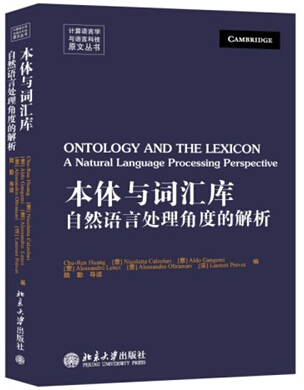
Ontology and the Lexicon: a Natural Lan-Guage Processing Perspective
[Book Description]
The relation between ontologies and language is currently at the forefront of natural language processing (NLP). Ontologies, as widely used models in semantic technologies, have much in common with the lexicon. A lexicon organizes words as a conventional inventory of concepts, while an ontology formalizes concepts and their logical relations. A shared lexicon is the prerequisite for knowledge-sharing through language, and a shared ontology is the prerequisite for knowledge-sharing through information technology. In building models of language, computational linguists must be able to accurately map the relations between words and the concepts that they can be linked to. This book focuses on the technology involved in enabling integration between lexical resources and semantic technologies. It will be of interest to researchers and graduate students in NLP, computational linguistics, and knowledge engineering, as well as in semantics, psycholinguistics, lexicology and morphology/syntax
[Table of Contents]
Part I. Fundamental Aspects:
1. Ontology and the lexicon: a multi-disciplinary perspective Laurent Prévot, Chu-Ren Huang, Nicoletta Calzolari, Aldo Gangemi, Alessandro Lenci and Alessandro Oltramari;
2. Formal ontology as interlingua: the SUMO and WordNet linking project and GlobalWordNet Adam Pease and Christiane Fellbaum;
3. Interfacing WordNet with DOLCE: towards OntoWordNet Aldo Gangemi, Nicola Guarino, Claudio Masolo and Alessandro Oltramari;
4. Reasoning over natural language text by means of FrameNet and ontologies Jan Scheffczyk, Collin F. Baker and Srini Narayanan;
5. Synergizing ontologies and the lexicon: a roadmap Alessandro Oltramari, Aldo Gangemi, Chu-Ren Huang, Nicoletta Calzolari, Alessandro Lenci and Laurent Prévot;
Part II. Discovery and Representation of Conceptual Systems:
6. Experiments of ontology construction with formal concept analysis SuJian Li, Qin Lu and Wenjie Li;
7. Ontology, lexicon, and fact repository as leveraged to interpret events of change Marjorie McShane, Sergei Nirenburg and Stephen Beale;
8. Hantology: conceptual system discovery based on orthographic convention Ya-Min Chou and Chu-Ren Huang;
9. What's in a schema? A formal metamodel for ECG and FrameNet Aldo Gangemi;
Part III. Interfacing Ontologies and Lexical Resources:
10. Interfacing ontologies and lexical resources Laurent Prévot, Stefano Borgo and Alessandro Oltramari;
11. Sinica BOW (Bilingual Ontological WordNet): integration of BilingualWord-Net and SUMO Chu-Ren Huang, Ru-Yng Chang and Hsiang-bin Lee;
12. Ontology-based semantic lexicons: mapping between terms and object descriptions Paul Buitelaar;
13. Merging global and specialized linguistic ontologies Manuela Speranza and Bernardo Magnini;
Part IV. Learning and Using Ontological Knowledge:
14. The life cycle of knowledge Alessandro Lenci;
15. The omega ontology Andrew Philpot, Eduard Hovy and Patrick Pantel;
16. Automatic acquisition of lexico-semantic knowledge for question answering Lonneke van der Plas, Gosse Bouma and Jori Mur;
17. Agricultural ontology construction and maintenance in Thai Asanee Kawtrakul and Aurawan Imsombut.

 新书报道
新书报道